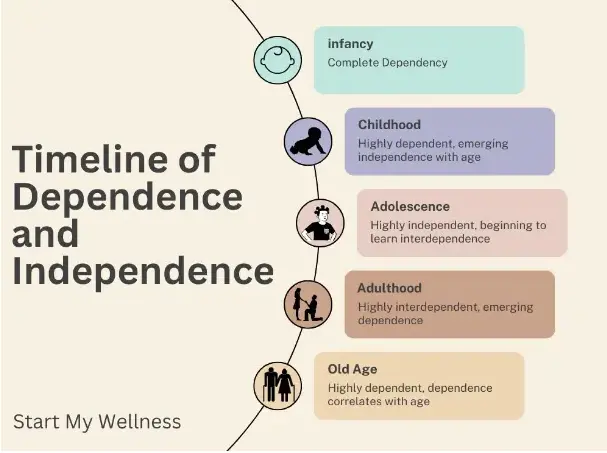In early life, children begin a journey to independence, a process as fundamental as it is challenging for both the child and their caregivers. The path to independence includes many trials and setbacks but leads children to autonomy and self-awareness.
Independence isn’t just a milestone; it shapes individuals’ personalities, self-esteem, and capability to face the world. For highly dependent individuals, independence can be learned and nurtured. The process involves offering support while allowing children to explore, make mistakes, and learn from them.
Through understanding children’s needs and boundaries while building self-reliance and problem-solving skills, parents and caregivers can foster independence in their children and prepare them for self-reliance in adulthood.
The Importance of Independence in Development
Independence is a cornerstone of child development and is critical in shaping confident, competent, and resilient individuals. As children grow, their desire to do things themselves, make choices, and take responsibility increases. In turn, the natural progression towards autonomy is vital for their self-esteem and self-efficacy, laying the foundation for success later in life.
Another way to say this is that independence lays the foundation of being an adult. Adults are fully autonomous individuals capable of making their own decisions and accepting the consequences of those decisions.
Through independent thought and action, children learn to trust their abilities, develop perseverance, and think for themselves. In this sense, independence is not just an individual’s ability to do things independently but also an inner compass that helps developing children understand their place in the world.
The Distinction Between Independence and Interdependence
Independence is often contrasted with dependence, where dependence is seen as undesirable. However, both dependence and independence are natural and appropriate for specific developmental stages.
- Infants are born completely dependent and require support and care to develop.
- As children grow, they become increasingly independent until adulthood.
- Adults are fully independent and, in some cases, interdependent.
- The Elderly become increasingly dependent as they age, with greater care required the older an individual is.
Interdependence is a state of being where an individual is fully self-reliant, but still relies on and supports another interdependent individual. Interdependent individuals are capable of being independent but choose to depend on, and support, others.
Interdependence recognizes that we all have inherent strengths and weaknesses that when synergized, provide a strong and supporting relationship.
However, in order for individuals to achieve interdependence, they must first learn to be independent, and learning independence is a fundamental journey that every child embarks on.
For more information please check out this informative Video:
Unraveling Codependency: Understanding the Roots and Motivations Behind Dependency in Relationships
Can Independence be Learned?
Independence is gradually learned through parental figures or role models demonstrating competency, self-reliance, and healthy and productive boundaries. While parents or educators usually teach this, children can also learn to be more independent from their peers.
Creating an environment that encourages exploration and decision-making fosters the development of independence. By providing opportunities for children to try new tasks, make choices, and even face the consequences, adults can help children learn the value of independence and its associated skills, such as problem-solving, critical thinking, and self-reliance.
However, in the same way, dependence can be reinforced in an environment where children don’t have a way to practice thinking or doing things for themselves. When children aren’t encouraged to explore, set boundaries, or do things independently, they can become reliant on others for guidance and support.
This learned reliance can not only hinder their personal development and self-esteem but can also impact their educational and professional lives if they are not prepared to make decisions, take initiative, or face new challenges.
Because there is always a give-and-take between autonomy and dependence, fostering independence in children is a delicate journey that involves gradually providing responsibilities for a young person at their current development (e.g., whether they are a toddler, child, or adolescent) and allowing a child the freedom to explore their own capabilities.
Particularly in the early phases of learning independence, there may be attempts at independence which do not work out well. In these cases, it is important for the parent or caretaker to reassure and accept these early failures, without judgment. These episodes become learning opportunities and encourage future mastery.
Encouraging and Fostering Independence: Strategies for Parents and Caregivers
As children grow, they embark on a journey towards increasing independence. This process doesn’t happen overnight and is gradual.
However, personal growth is always a journey, and some individuals take different trajectories. For children or individuals who aren’t meeting developmental milestones or may be too dependent for their age, there are several ways to encourage and teach independence as parents, caretakers, and educators.
Here are strategies for encouraging and fostering independence in children:
- Provide Opportunities for Choice: Even at a young age, children can be given the chance to make choices, such as selecting their clothes or deciding on a snack. This practice also helps them understand the consequences of their choices.
- Set Realistic Tasks and Expectations: Assign responsibilities that are age-appropriate and achievable.
-
- Gradually Increase Responsibility: As your child grows, gradually increase their responsibility. This can include more household chores, managing a small budget, or planning parts of family activities as children get older.
- Encourage Collaborative Problem-Solving: Guide children to think through solutions to age-appropriate problems and ask open-ended questions like “What do you think we can do about this?” to promote critical thinking and problem-solving.
- Celebrate Effort and Progress: Acknowledge and praise your child’s efforts towards independence, even if the outcome isn’t perfect.
- Model Independence: Children learn a great deal from observing adults. Display your own independence and problem-solving skills in daily tasks.
- Foster Safe Exploration: Create a safe environment where children feel comfortable exploring and trying new things.
- Explore Child Therapy: It takes a village to raise a child and having a child therapist experienced with teaching strategies and skills to children is invaluable. Child therapy can focus on decision-making, problem-solving, behavioral issues, and developing independence.
For more information about finding the right Child Therapist, please read this informative article:
Start My Wellness: Finding a Child Therapist
Begin Your Journey to Self-Reliance with Start My Wellness
The journey to independence is different for everyone and can be particularly challenging for some individuals. Recognizing that each child’s path to autonomy is unique, teaching independence requires a balance of guidance and acceptance.
If you need guidance and support with your child’s journey, Start My Wellness is here to help. Our team of compassionate professionals are here to provide the strategies and support your child needs to succeed.
Call our office at (248)-514-4955 today to schedule an appointment and meet our therapists.
We look forward to hearing from you!
Sources

Author: Anton Babushkin, PhD
Looking for a Therapist? Start My Wellness has highly experienced Licensed Therapists that are currently accepting new patients.



